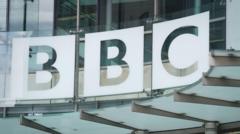The BBC has firmly countered allegations from the White House regarding its reporting on the Gaza conflict, specifically responding to claims that it retracted a story and inaccurately reported casualty figures. During a press briefing, White House press secretary Karoline Leavitt criticized the BBC for allegedly relying on information from Hamas and for altering the number of casualties related to a shooting incident near an aid distribution site. In a statement, the BBC labeled these claims as "completely wrong," affirming that no story had been removed, and expressing confidence in its journalistic practices.
The BBC clarified that its coverage reflects real-time updates, as has been customary in fast-developing news situations. In their communications, BBC representatives indicated that all casualty counts, which varied throughout the day, were transparently attributed to their sources, starting with initial reports of 15 casualties from local medics and escalating to conflicting accounts from various agencies, including a final tally of "at least 21" as confirmed by the Red Cross.
The situation at the aid distribution center in Rafah remains contentious, with civilian witnesses and NGOs reporting shootings, while the Israeli military contests these narratives, asserting that no fire was directed toward civilians. An additional layer of complexity is introduced by the Gaza Humanitarian Foundation (GHF), a group supported by both the US and Israel, which dismissed the reports as "outright fabrications."
Complicating matters further, the White House specific allegations of the BBC failing to substantiate claims made in a viral video that purportedly linked to the aid location. However, the BBC underscored that this video was not utilized in its news broadcasts and did not shape its coverage. They argued that conflating the two distinct issues misrepresents the reality of journalistic reporting during crises.
As the international community observes the ongoing conflict, journalists have faced significant obstacles. The BBC and other media organizations currently contend with restrictions that prevent access to Gaza, complicating efforts to achieve accurate reporting and verification. The BBC continues to advocate for more open conditions for journalists in the region in their aim to deliver factual accounts of unfolding events. The conflict has escalated dramatically since Israel launched military operations on October 7, 2023, following a notable cross-border attack by Hamas that resulted in considerable casualties on both sides.

















